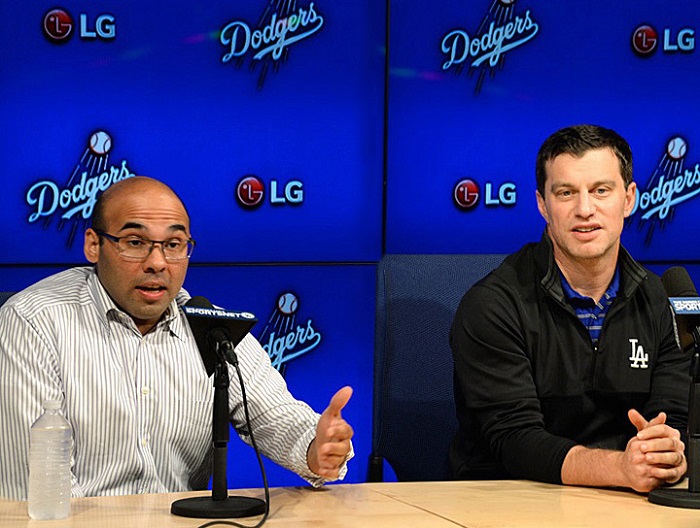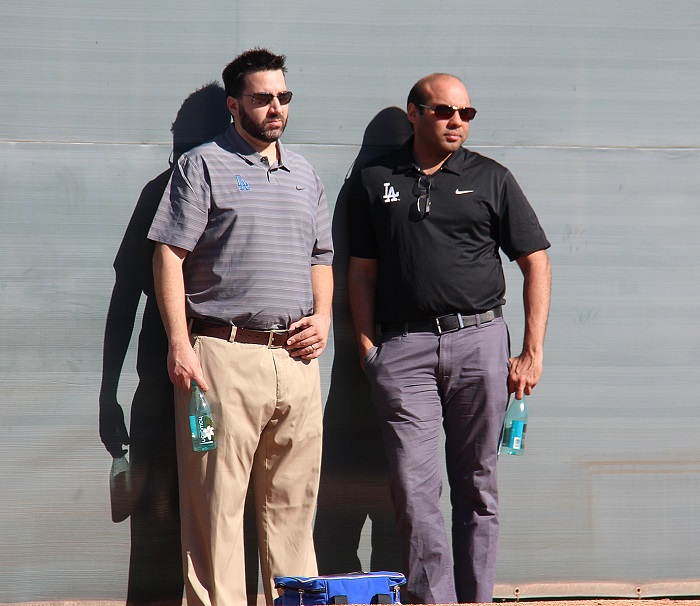Minor league baseball prospects are the life blood for major league baseball. Regardless of their prospect status each minor league player plays a significant role in keeping the feeder system for MLB teams alive. If the prospects are the life blood of professional baseball then the scouts that uncover them are the oxygen that infuse life into the moving parts in the minor league system.
It seems that the value of scouts might have come into question over the past few years with the move towards the adoption of sabermetrics and analytics into MLB front office decision making. That is, are scouts the oxygen that feed the system or now just an add-on with mathematical formulations leading the way?
As a Dodger fan I am most interested in what the Dodgers front office is doing by way of scouting since Andrew Friedman and Farhan Zaidi have a reputation for being analytics driven. In the final analysis it is difficult to uncover information and there does seem to be two sides to the story which may not be mutually exclusive.

Dodgers general manager Farhan Zaidi and president of baseball operations Andrew Friedman.
(Photo credit – Jon SooHoo)
My interest was piqued when I came across an article by Bob Nightengale in USA Today. He writes: “Baseball’s close-knit scouting fraternity has been besieged by wholesale layoffs this winter, with many pro scouts still unemployed one month before the start of spring training.”
Nightengale continues: “Teams are relying more heavily on analytics and sabermetrics than at any time in baseball history, with teams treating veteran pro scouts as if they’re old eight-track car stereos, needless in today’s game. Even McIlvaine, the former GM of the Mets and Padres.”
He quotes Wade Boggs, who was discovered by the late Red Sox scout George Digby. “If it wasn’t for Digby, Boggs said, he would have been driving a UPS truck for a living.” The Hall of Fame third baseman broke down in tears while being interviewed by Molly Secours, who is directing and producing a movie on the life of baseball scouts entitled “Scouting for Diamonds.’’
The Major League Baseball Scouting Bureau, which once employed 58 scouts, has been stripped down to 17, and getting smaller, with scouts advised to start looking elsewhere. The bureau is not closing down but director Bill Bavasi acknowledged that it is moving in a different direction. It will start focusing on providing video and medical information on players as well as paying more attention to international players.
Major League Baseball owners, despite earning more than $8 billion in revenue in 2013, voted in January of 2014 to allow individual teams to slash or eliminate pension-plan offerings to their non-uniformed personnel. The retirement plans of any baseball employee not wearing a big league uniform may be affected by the decision, including secretaries, scouts, front-office executives, and minor league staff.
Some of those personnel, particularly at the minor league level and in amateur scouting, make less than $40,000 a year and rely on pensions in retirement.
Rob Neyer of Fox Sports feels that Nightengale overstated the scouting situation. Neyer writes that the scouting profession isn’t downsizing but rather it is evolving to meet different demands. That is, to progress in concert with analytics and meet the demands on the international scene.
Neyer acknowledges that there may well be scouts who cannot find work but the number of scouts is not decreasing but in fact increasing. By using Baseball America Directories he looked at 15 franchises in 2012 and 2015. He concluded; “By my count, there were 639 full-time scouts (or other personnel with scouting backgrounds or responsibilities) in 2012, and 724 in 2015. Which represents an increase from 43 per team to 48. In particular, the Red Sox, Cubs and Dodgers seem to have particularly expanded their scouting departments.”
Last August the Dodgers fired a battery of international scouts, many of whom had been poached from the Seattle Mariners in November 2012. Those departures included Vice President Bob Engle, Patrick Guerrero (the Dodgers’ scouting coordinator in Latin America), Franklin Taveras (the club’s scouting coordinator in the Dominican Republic), Joseph Reaves (the director of international and Minor League relations), Rafael Colon (special advisor for international player performance), Hidenori Sueyoshi (senior manager of international scouting), and Bruce Hurst (Latin America field coordinator).
Why did the Dodgers fire this bevy of renowned scouts?
”The only explanation I got was that they wanted to go in a different direction and nothing else,” Patrick Guerrero said from the Dominican Republic. “I understand. That’s baseball.”
One has to wonder what that different direction is.
Perhaps the direction is now in the hands of Dodgers Vice President Alex Anthopoulos who, is his last six years as the General manager of the Toronto Blue Jays, hired more professional scouts than any team in baseball.
Anthopoulos was well aware of analytics but even more so aware of the value of a strong scouting contingent.
“The best moves we made were the ones we didn’t make because of the information we got from our scouts,’’ Anthopoulos said. “Sure, you look at the analytic side, but you’re talking about the human side, too. We looked at plenty of guys who could help us, but our scouts would give us information, letting us know that they wouldn’t fit into this group or dynamic that we had here. … “This game is so competitive, you need to get every ounce of information you can to try to separate yourself, and our scouts played such a big part in our success.’’

Dodgers vice president of baseball operations Alex Anthopoulos and general manager Farhan Zaidi taking in a bullpen session during spring training. (Photo credit – Ron Cervenka)
Perhaps his emphasis will not only be on increased and improved international scouting but in beefing up advance scouting. Anthopulos, whose Blue Jays fell to the Kansas City Royals in the play-offs last fall, might have been the victim of superior advance scouting by the Royals.
Towards the end of August, one month earlier than the usual time to begin advance scouting for post season play, Royals General Manager Dayton Moore met with several front-office executives and scouts, including Gene Watson, director of pro scouting. Moore had already targeted the Blue Jays as the team to beat and directed Watson to begin an all out blitz of advance scouting of the Jays.
Watson wouldn’t say whether he believes the Blue Jays’ reputation for stealing signs was warranted and of course wouldn’t specify how the Royals addressed it, if it were true. But he did say the Royals, through advance scouting, were able to “defuse the situation.”
“We learned quite a bit,” Watson said. “Very useful information.”
Just as interesting was information on possible “pitch tipping.” Royals scouts had noticed that when pitcher David Price picked up his right leg to throw home, he tended to point his toes down toward the plate. As the report noted, most pitchers pick up a foot with the toes pointed at first base, and thus Conroy and Gibson were convinced that Price’s toes-down style made it easy to read, thus allowing the Royals to run on first movement. That, of course, is a big advantage for the runner and the advance scouts’ read on Price allowed Alex Rios to steal a significant base in Game-6 of their series with the Jays.
“One of the things that we’ve done — and I’m fully accountable for this — is we have perhaps overly relied on numbers…” – Red Sox owner John Henry
“It just shows the value of good old-fashioned scouting,” Watson said. “And the value of Dayton knowing so far ahead of time it would be Toronto we had to beat.”
The jury is still out on analytics, at least for me, where those on the same team do not always agree. On the one hand, Red Sox owner John Henry said in late February, ”I think we were reliant too heavily on analytics,” in trying to explain the team’s poor performance for the last three years.
On the other hand, according to the Red Sox president of baseball operations Dave Dombrowski, the team has expanded the budget of its analytics department and plans to add staff to that department. Its belief in the ability of analysis to create an edge remains very much intact.

Although Red Sox owner John Henry doesn’t plan to cut his analytics staff, he said that he plans to rely less on analytics and more on scouting this season.
(Photo credit – Mark Garfinkel)
So what is the status of the Dodgers MLB scouting? Although some of us fear that analytics are taking over in the Dodgers Front Office, that may not be the case. That is, analytics may not trump scouting but just be a tool to use to gather information on players to complement scouting reports. Certainly an expectation is that the current foray into international scouting will continue and intensify and that more importance may well be placed on advance scouting.
To rely on analytics as the trump card, especially on the mirage of WAR, at the cost of scouting would be utter folly. Analytics cannot pick up on those intangibles that help build winners – heart, work ethic, health, character, teammate quotient.
Here’s hoping the Dodgers are working to develop the best scouting system in MLB for draft purposes, for international scouting and for advance scouting. Here’s hoping that the scouting team becomes the best at what venerable scout Jim Walton calls “meaningful watching.”




 March 12th, 2016 at 10:45 am
March 12th, 2016 at 10:45 am  by Harold Uhlman
by Harold Uhlman  Posted in
Posted in 

“Analytics cannot pick up on those intangibles that help build winners – heart, work ethic, health, character, teammate quotient.”
Exactly! I can see where analytics can be a useful tool, but only a tool. Nothing beats going out there and looking. I wonder how many HOF’s wouldn’t have had the chance if they depended on analytics. How would analytics have ranked a wild lefty named Sandy Koufax? How about a pitcher named Maury Wills?
I’m with you on hoping the Dodgers build up the best scouting system in MLB. They done much to create a sustainable quality team, can’t be leaving this vital part out.
I think MLB teams are changing their viewpoint on analytics and are beginning to realize that while analytics are an excellent tool, they are just that – a tool.
Although I’m sure I’ll get a rise out of some folks for saying this but I think that Wins Above Replacement (WAR) is ridiculously overrated and has blinded and deafened good old-fashioned eyes and ears. Judging guys by what they did in the past as opposed to ‘what have you done for me lately’ is why salaries today are so insane.
I understand that you have to rate current players somehow, but why not set base salaries and then go hog wild with incentives for stats, ASG appearances, Cy Youngs, MVPs, etc.? Pay a guy for what he does, not for what he did.
Changing gears a bit, since I began covering the Quakes several years ago, I have come to know several MiLB scouts – most from other organizations. It is truly remarkable how much time and effort they put into their work and, even more so, the incredible detail of their records. Fun stuff indeed.
Great article. Just ask Kirk Gibson about the value of advance scouting. Former scout Bill Lajoie wrote a book called “Character Is Not a Statistic.” Haven’t gotten around to reading it, but it’s something to think about.
Statistics can be made to prove almost anything. I don’t understand how WAR is calculated, but I don’t think it’s anything more than a shorthand method for attempting to compare player values. I think the players and coaches have a better idea of who the most valuable guys in the league are. I like Ron’s idea of basing more of a player’s salary on current performance, not what he did in his last year before hitting free agency, but alas, it will probably never happen.
I think Farhan Zaidi’s comments are spot on: Zaidi said he believes numbers tell only part of the story.
“Every mathematical model is a gross simplification of reality,” Zaidi said. “So every time you see a metric, you’re sort of asking yourself not only what it’s telling you but also what it’s missing, because there’s always something that’s missing.”
That’s why Zaidi said it was important to also use traditional methods of evaluating players.
“Our quest isn’t just evaluating how good players are, it’s how good players are going to be,” he said. “How are you going to identify guys that are going to break through? How are you going to identify guys that make a mechanical adjustment and turn into a completely different player? That’s why you need this sort of holistic approach in baseball operations, because otherwise you’re going to miss out on a whole swath of opportunities.”
Seems clear to me, at least for Zaidi, that scouting and analytics are both important to the Dodgers organization. Regarding the firing of several international scouts, perhaps it was the result of some very poor signings at the cost of $100+MM and those responsible being held accountable and/or come July 2, 2016 the Dodgers being prevented from signing international amateur free agents for more than $300K.